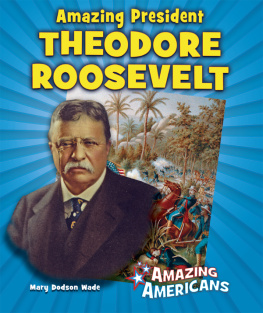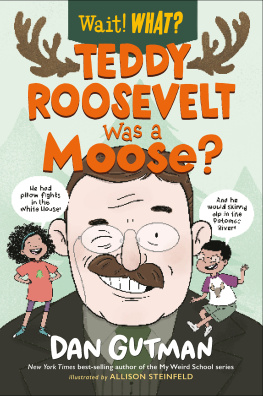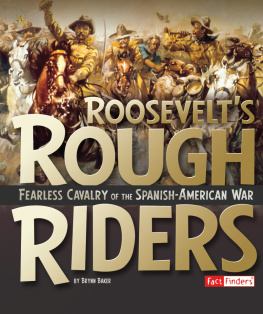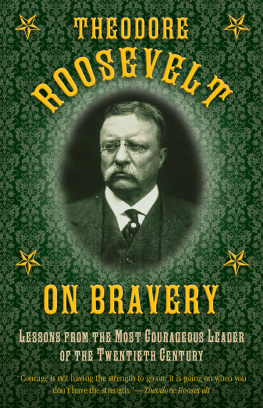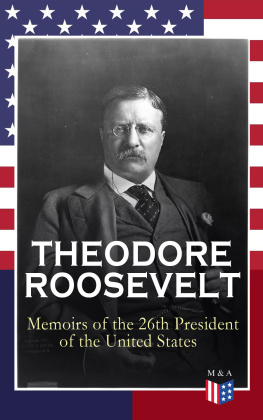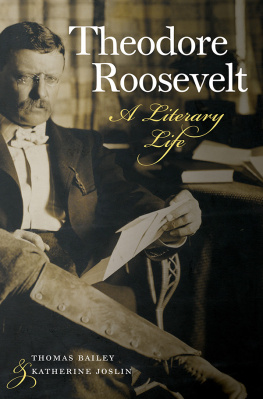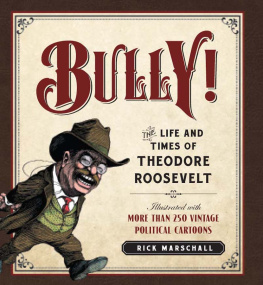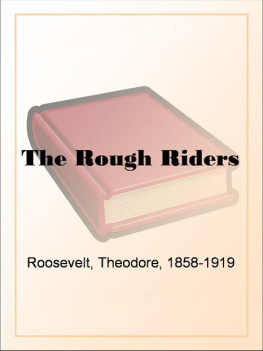

Naval Institute Press
291 Wood Road
Annapolis, MD 21402
2013 by M. David Key
All rights reserved. No part of this book may be reproduced or utilized in any form or by any means, electronic or mechanical, including photocopying and recording, or by any information storage and retrieval system, without permission in writing from the publisher.
Library of Congress Cataloging-in-Publication Data
Key, M. David.
Rough rider : the life of Theodore Roosevelt / M. David Key.
1 online resource.
Includes bibliographical references.
Description based on print version record and CIP data provided by publisher; resource not viewed.
ISBN 978-1-61251-244-0 (eBooks) 1. Roosevelt, Theodore, 18581919. 2. PresidentsUnited StatesBiography. I. Title.
E757
973.911092dc23
[B]
2013033590

 Print editions meet the requirements of ANSI/NISO z39.48-1992 (Permanence of Paper).
Print editions meet the requirements of ANSI/NISO z39.48-1992 (Permanence of Paper).
21 20 19 18 17 16 15 14 13 9 8 7 6 5 4 3 2 1
First printing
To David Farber, patient adviser,
and
Adam Kane, patient editor

Contents


T heodore Roosevelt was born just prior to the start of the Civil War and died just after the end of World War I. The six decades during which he lived saw the United States emerge as one of the worlds wealthiest and most powerful nations. That profound alteration in the nations status came with many growing pains as Americans experienced a multitude of changes in their daily lives. To some extent, the complexities of the era are mirrored in the complex nature of Theodore Roosevelt, a man who helped lead the United States through those changes while hoping to maintain its traditional values as he understood them.
This brief biography of Theodore Roosevelt serves as an introduction to the man and the era in which he lived. It is designed with busy readers in mind, and some complex subject matter has been digested into brief passages. My goal is to engage readers rather than to oversimplify such topics, with the hope of prompting additional exploration into the subject. By necessity, a brief biography omits many fascinating details and analytical pointsnot to slight them, but to ensure that they are not relegated to mere digressions. The focus here is on the military and political careers of Theodore Roosevelt, and in several places multiple viewpoints have been introduced into the narrative to invite readers to develop their own conclusions. The book is based on the published primary and secondary sources listed in the bibliography, although quotations and footnotes from those sources have been kept to a bare minimum.
Between 1860 and 1920 the United States became a heavily industrialized and increasingly urbanized nation that adapted to major new technologies in transportation and communication as it attracted large populations of immigrants from other continents. A biography of Theodore Roosevelt cannot tell that entire story, but focusing on an individual whose words and deeds were well known and widely discussed during the period can lead to a better understanding of the broader trends. And by focusing particularly on Theodore Roosevelt, we are certain to be entertained in the process.

O n October 27, 1858, Martha Mittie Roosevelt gave birth to her second child, Theodore Roosevelt Jr., in New York City. Martha hailed from a prominent Georgia family, the Bullochs. She met Theodore Sr. when the young man accompanied his brother-in-law, who was courting Marthas half-sister, on a trip to the South. After their wedding in 1853 the Roosevelts took up residence in a three-story brownstone on East Twentieth Avenue in New York City. Mr. Roosevelt was a successful merchant, particularly of imported glass. Later he turned his energies to banking and was successful in that area as well. The family was not extremely wealthy by New York society standards, but neither did they lack for material comforts.
During his childhood young Teedie, as the family called him, showed few signs that he would become one of the most prominent figures of the postCivil War generation of Americans who became well-known reformers during the Progressive Era.with highly visible disparities between wealth and poverty, and with new technologies that broke down communication and transportation barriers and led to the creation of a national culture. As he matured, Roosevelt grew to embody his generations progressive spirit, demonstrating his embrace of the prevailing attitudes of the movement in his political actions. His martial spirit and private intellectual endeavors would be influential in shaping the country and its culture.
The Bullochs and the Roosevelts occupied a specific place in the American social hierarchy. John Adams and Thomas Jefferson perhaps best defined this natural aristocracy in a series of letters written to each other late in their lives. Both agreed that the possession of certain traits placed some people above the others, specifically: intelligence, appearance, wealth, virtue, and family name, with appearance and family name being the least important of these. Intelligence produced wealth, but accumulating wealth was mere greed unless the wealth was combined with virtue; that is, with efforts to improve ones community. Mr. and Mrs. Roosevelt, by most accounts a handsome and intelligent couple, were part of Americas natural aristocracy both by birth and because of their wealth and their charity work. The Roosevelts came from an old family that traced its roots in America back to the settlement of New Amsterdam. The Bullochs were wealthy southern planters. Charity work was a key part of the Roosevelts lives. Among other things they helped found the New York Childrens Aid Society.
Young Theodore was fortunate to be surrounded by a compassionate family with means. He was a sickly, small child plagued by asthma throughout his youth. His eyesight, always weak, grew worse with age; indeed, at the height of his fame he was completely blind in one eye, although he disguised it so well that few people knew. In spite of the advantages inherent in his familys position, as a young boy he hardly seemed destined for fame, let alone the legendary status he later achieved. The drive and determination that brought him to that level, however, surfaced early. The young Roosevelt used the obstacles imposed by his ailments as a source of motivation; it was a trait that would benefit him throughout his life.

Roosevelts biographers attribute the development of his personality to his father, and Theodore Jr.s own assessment was much the same. He received devoted attention from both of his parents as well as his three siblings, the domestic help, doctors, and a series of private tutors. The sickly child was given every advantage in education, and his inventive mind was fascinated by the world around him. He wanted to be a naturalist when he grew up, a plan he maintained until he was in college. He enjoyed collecting insects and classifying plants and animals, and his inability to run and roughhouse with the other children further set him apart. Indeed, his asthma attacks were sometimes so acute that any movement at all was barely possible. When he later recalled his childhood, he remembered most of all his fathers presence during those bouts of sickness, as well as his encouragement of young Theodores quest for knowledge.
Next page

